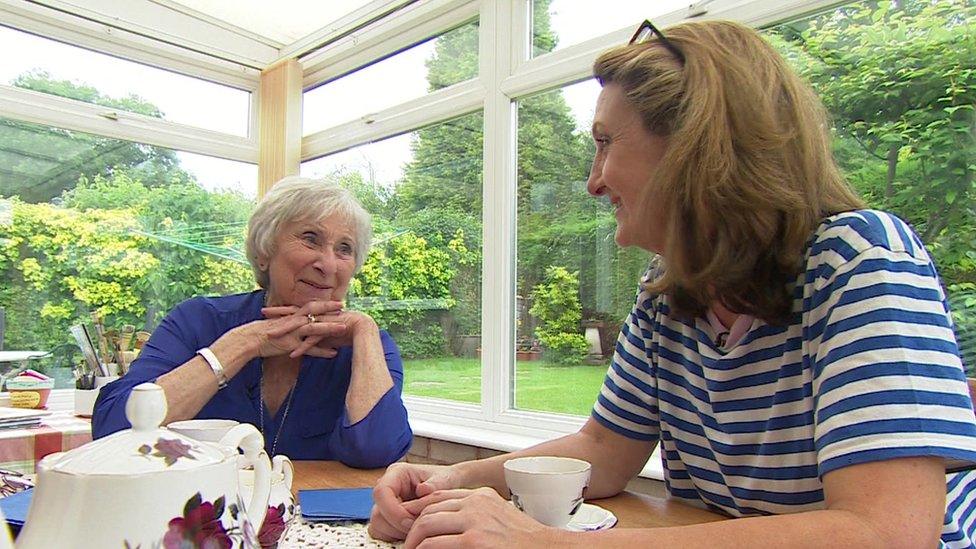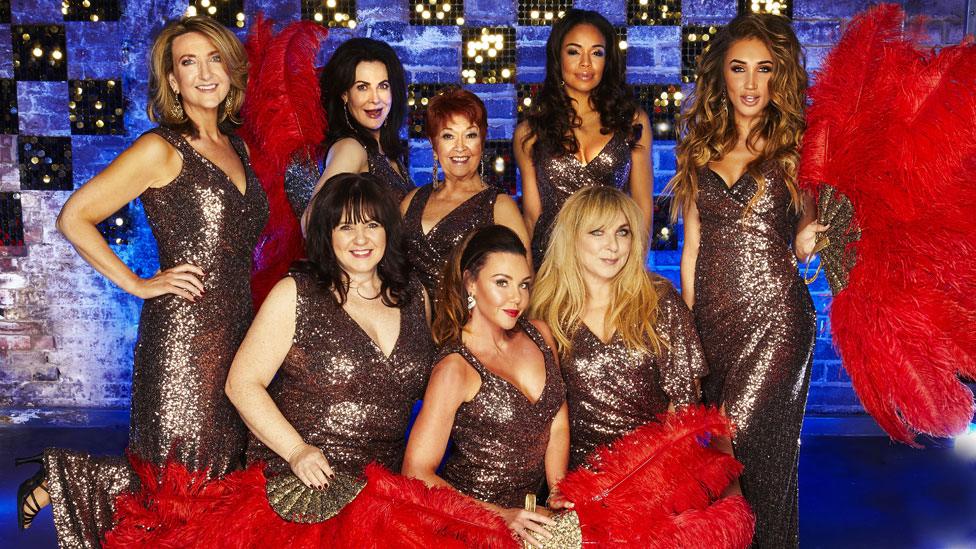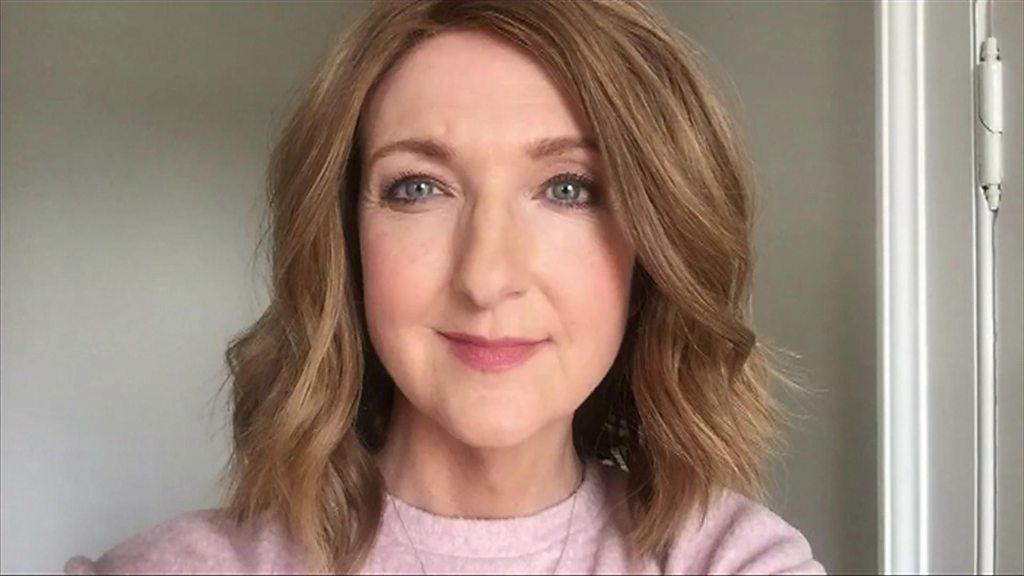'How a TV show led to my cancer diagnosis'
- Published
Victoria, Margaret and Maren: 'We're here for each other'
When BBC journalist Victoria Derbyshire spoke openly about the symptoms that led to her breast cancer diagnosis on ITV's The Real Full Monty, two women contacted her to say it led to them being diagnosed themselves. Derbyshire has been to meet them.
"I want to thank you for saving my life."
This was the first line of an email sent to me by 86-year-old Margaret Witts, who had watched me talk about my experience of breast cancer on ITV's The Real Full Monty: Ladies' Night.
Several weeks later, I went to meet her, along with Maren Marshall, 53 - who also got in touch to let me know she too had been diagnosed following the programme - to chat over tea and cake.
"I'd got myself a nice big glass of sherry and I sat down, put my feet up on my recliner, put a blanket over my legs [to watch the Real Full Monty], and was looking forward to the next day because that was when family were coming."
Margaret says she laughed and cried along with the programme, but something struck her.
"You said that you'd found you had an inverted nipple and that your breast had gone flat," Margaret tells me, "and that's when you had the alarm bells ringing.
"At the end of the programme it flashed up, 'Now ladies, go check your breasts'.
"I stood in front of the full-length mirror and there it was, that one [breast] was much shorter than the other.
"The nipple had gone right up and half inside. Then I started to feel my nipple, and there was this craggy-feeling lump."
Margaret was in "total disbelief".
An inverted nipple is not always a sign of cancer - some people are born with them or they can develop over time - but if there is a sudden change in appearance it should be checked out immediately.
According to the charity Breast Cancer Care, a third of people who develop breast cancer are diagnosed after finding a symptom other than a lump.
'You go into overdrive'
Maren, too, was struck by the mention of an inverted nipple.
"I've always had an inverted nipple, but it was slightly more inverted than previously.
"When I don't wear a bra I'd notice that I had a significant dip, whereas before it was quite flat," she says.
Without the programme, she adds, "I don't believe that I would have done something about it.
Breast surgeon Jennifer Rusby explains how women should check themselves
"I think I might have mentioned it in passing to my doctor that my nipple started disappearing, but I don't know that I would have gone there with that appointment in mind, that I needed to talk to him."
Maren was diagnosed with breast cancer following a hospital appointment in May, and has now had a lumpectomy to remove the tumour and surrounding tissue.
Margaret is having a mastectomy in June.
"I think this coming so soon after my husband's death, it's just something else I could have done without. But it's here.
"After [the mastectomy], I won't be stuck with it, I'll be stuck with being flat one side, but I can get over that. It's not the end of the world.
"It's just that word 'cancer' - it affects everybody, you go into overdrive."

Inverted nipple
Inverted nipple is the name given when the nipple becomes pulled in
It is not always linked to cancer - some women are born with an inverted nipple and others develop it through life, such as after breastfeeding
If a nipple becomes suddenly inverted, or appears different to how it was before, it should always be checked by a medical professional
A third of people who develop breast cancer are diagnosed after finding a symptom other than a lump
Source: Breast Cancer Care
Information on the signs and symptoms of breast cancer, including those lesser known ones, can be found here, external.

Maren says she is still "a little bit raw and numb" following the experience, joking that she is probably still coming round from the anaesthetic.
"I don't even remember Joe, my nurse specialist, using the word 'cancer' when he spoke to me.
"I remember, 'We need to sit down for this', but I don't remember ever hearing the word cancer until the following week when he phoned me and I was in the park."

"It will be gone and I shall be free of it," Margaret told Victoria Derbyshire
She says she has taken the decision to let colleagues and friends know she has cancer.
"I've told everybody. It's not a sympathy vote, I just want people to understand that this loud, gobby, forthright female is possibly going to be a little bit moody and up and down.
"I'd rather they were asking me what was wrong than whispering about me in the corner saying, 'What's the matter with her, she's a little bit down today.'"
Margaret says she has taken comfort in speaking to others too.
"It's not a death sentence. It will be gone and I shall be free of it," she says, resolutely.
Thankfully, the outlook for both women is much more optimistic than it would have been had they chosen to watch a different channel that night.
Watch the BBC's Victoria Derbyshire programme on weekdays between 09:00 and 11:00 on BBC Two and the BBC News Channel in the UK.
- Published30 March 2018

- Published3 April 2017
